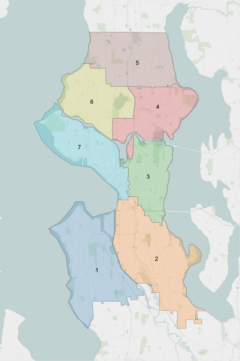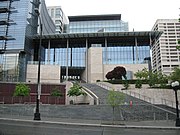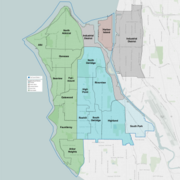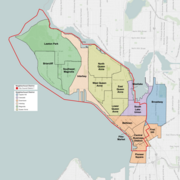Seattle City Council
Seattle City Council | |
|---|---|
| City Council | |
 | |
 Map of the seven districts effective January 2016 Map of the seven districts effective January 2016 | |
| Type | |
| Type | |
| Houses | Unicameral |
| Leadership | |
President of the Council | Sara Nelson (D) |
| Structure | |
| Seats | 9 |
 | |
Political groups | Democratic (9) |
| Committees | List
|
Length of term | 4 years |
| Elections | |
| First-past-the-post with a Nonpartisan blanket primary | |
Last election | November 7, 2023 |
| Meeting place | |
 | |
| Seattle City Hall 600 Fourth Avenue, Second floor Seattle, Washington 98104 | |
| Website | |
| http://www.seattle.gov/council/ | |
| Constitution | |
| Charter | |
The Seattle City Council is the legislative body of the city of Seattle, Washington. The Council consists of nine members serving four-year terms, seven of which are elected by electoral districts and two of which are elected in citywide at-large positions; all elections are non-partisan. It has the responsibility of approving the city's budget, and passes all legislation related to the city's police, firefighting, parks, libraries, and electricity, water supply, solid waste, and drainage utilities. (The mayor of Seattle is not considered part of council.)
Members
[edit]- Last election: November 2023[1]
| District | Member | Party preference | First elected |
|---|---|---|---|
| 1 | Rob Saka | Democratic | 2023 |
| 2 | Tammy Morales | Democratic | 2019 |
| 3 | Joy Hollingsworth | Democratic | 2023 |
| 4 | Maritza Rivera | Democratic | 2023 |
| 5 | Cathy Moore | Democratic | 2023 |
| 6 | Dan Strauss | Democratic | 2019 |
| 7 | Bob Kettle | Democratic | 2023 |
| 8 (at-large) | Alexis Rinck | Democratic | 2024[a] |
| 9 (at-large) | Sara Nelson | Democratic | 2021 |
- Notes
- ^ Alexis Rinck was elected to the City Council in a November 2024 special election triggered initially by the resignation of Teresa Mosqueda and subsequent appointment of Tanya Woo.
Elections
[edit]Election of city council members occur on odd-numbered years, with at-large seats staggered from district seats. City council members' terms begin January 1 although public ceremonies are held on the following Monday.[2] The council positions are officially non-partisan and the ballot gives no party designations.[3] Party identification is based on candidates' voluntary self-identification. Like other elections in Washington, all candidates run together in the primary with the top two progressing to the general election.
Candidates may participate in Seattle's unique democracy voucher program, which provides residents with vouchers to give candidates for public campaign funding.
Districts
[edit]
Beginning in 2015, the geographic outline of the 7 districts and 2 citywide positions are as follows. Some neighborhoods overlap more than one district, indicated with an asterisk*.[5] Redistricting occurs every 10 years following the decennial U.S. census, beginning in 2022.[6]
| District | Neighborhoods |
|---|---|
| 1 | West Seattle, Delridge, South Park, Harbor Island, Industrial District* |
| 2 | Beacon Hill*, Central District*, Downtown*, Rainier Valley*, Georgetown, Columbia City, Seward Park, Chinatown/International District, Industrial District* |
| 3 | Beacon Hill*, Capitol Hill*, Cascade*, Central District*, First Hill*, Montlake, Rainier Valley* |
| 4 | Bryant, Cascade*, Fremont, Laurelhurst, Maple Leaf*, Ravenna, Roosevelt, Sand Point, University District, View Ridge, Wallingford*, Wedgwood* |
| 5 | Bitter Lake, Broadview, Greenwood*, Haller Lake, Lake City, Maple Leaf*, North Beach/Blue Ridge*, Northgate, Roosevelt*, View Ridge, Wedgwood* |
| 6 | Ballard, Crown Hill, Fremont*, Green Lake*, Greenwood*, North Beach/Blue Ridge*, Phinney Ridge, Wallingford* |
| 7 | Belltown, Capitol Hill*, Cascade*, Downtown*, First Hill*, Interbay, Magnolia, South Lake Union, Queen Anne |
| 8 | At-large position, citywide |
| 9 | At-large position, citywide |
-
District 1
-
District 2
-
District 3
-
District 4
-
District 5
-
District 6
-
District 7
History
[edit]Seattle was first incorporated as a town by an act of the Territorial Legislature on January 14, 1865. The town charter established a five-member board of trustees to govern Seattle, which appointed citizens to other positions.[7] The act was repealed January 18, 1867, after most of the town's leading citizens petitioned for its dissolution. Seattle was again incorporated, this time as a City, on December 2, 1869. The new unicameral legislature, known as the Common Council, was elected at-large to one year terms.[8] At-large election was replaced in 1884 by a system of 14 wards and four members elected at-large, all elected to two-year terms.[9]
The Home Rule Charter, adopted in 1890, reorganized the city council into a bicameral legislature, with a nine-member Board of Aldermen and a sixteen-member House of Delegates.[10]
District-based elections
[edit]In 2013, Seattle voters approved Charter Amendment 19 calling for the nine citywide Seattle City Council positions to be divided into seven district-elected seats and two citywide, at-large seats.[11] The elections for the two at-large seats are held as separate contests, thus results are not proportional. Each seat is filled in two-step process - a primary election is held in August, with the two most popular candidates going on to a general election in November.[12] The partial transition to districts started with 2013 elections for Positions 2, 4, 6, and 8 being truncated, two-year terms.[13]
The 2015 election cycle featured all nine seats, except the seven district positions were elected to full, four-year terms, and the two at-large positions would be for truncated, two-year terms.[13][12] The first primary based on the new combined district/at-large system was held on August 4, 2015, with the general elections held on November 3, 2015.[14]
The seven district seats were up for election again in 2023; the two at-large seats will be up for election again in 2025. Only two of the seven districts retained their incumbent member in the 2023 election.[15]
Timeline
[edit]- 1869–1883 – Seven at-large Council members elected for one-year terms.
- 1884 – Nine Council members elected: three from each of the three wards, elected to two-year terms.
- 1886 – One ward added, Council reduced to eight members: two elected from each ward for two-years terms.
- 1890 – The Home Rule Charter established eight wards and bicameral legislature. A Board of Delegates composed of nine at-large members was elected for four-year terms. House of Delegates had 16 members – Two from each ward, elected for two-year terms.
- 1892 – One ward added to make nine. Both houses to have nine members – all elected from wards.
- 1896 – New Home Rule Charter reestablished unicameral legislature with nine wards. One Council member elected from each ward for two years and four elected at large for four-year terms.
- 1905 – Two wards added to make 11. One Council member from each with four at-large – 15 council members total.
- 1907 – The Charter was amended twice during the year, the first time adding two more wards, increasing the size of Council to 17. Later, another ward was added (to make 14), increasing Council to 18 members.
- 1910 – The Charter was amended to abolish wards, reduce Council to nine at-large positions elected to three-year terms. This took effect in 1911 and remained constant until 1946. The 1910 Charter amendments also made the elections non-partisan. Prior to that candidates for Council (and other City offices) ran on party tickets.
- 1946 – The new Charter created the four-year term.[16]
- 2013 – City voters pass measure changing councilmember elections to a mostly-district-based scheme.
- 2015 – First councilmember elections held under new combined district/at-large scheme.
Salary
[edit]
In 2006, Seattle City Council salaries exceeded $100,000 for the first time. This made Seattle's city council among the highest paid in the United States, behind only Los Angeles and Philadelphia.[17]
As of 2021, salaries of district councilmembers are authorized to be $65.32 per hour.[18] Annually, councilmembers make as much as $140,000.[19]
Council President
[edit]The Seattle City Council picks among its peers a Council President to serve a two-year term, beginning January 1 of the year following an election. The Council President serves as the official head of the City's legislative department. In addition, they are tasked with:
- Establishing of committees and appointment of committee chairs and members.
- Presiding over meetings of the full council.
- Assuming the duties and responsibilities of Mayor if the Mayor is absent or incapacitated.
Notable past council members
[edit]- Bailey Gatzert, council member 1872–1873 and 1877–1878, in between was elected the city's first (and, as of[update], the only) Jewish mayor
- Arthur A. Denny, council member 1877–1879, leader of the Seattle pioneers known as the Denny Party
- A. W. Piper, pioneer, baker, socialist member 1877–1879. Eponym of Pipers Creek and Piper Orchard
- Henry Yesler, council member 1884–1885, Seattle pioneer, sawmill-owner, and twice mayor
- Hiram Gill, council member 1898–1902, 1904–1910, then mayor. Famous as an "Open Town" advocate, he later allied with "Closed Town" reformers.
- Reginald H. Thomson, council member 1916–1922. City Engineer and visionary. Championed the Denny Regrade, 1904 Great Northern Tunnel, development of the Cedar River watershed, railroad, electricity and sewage infrastructure improvements and member of team that designed Lake Washington's first floating bridge.[20][21]
- Bertha Knight Landes, council member 1922–1926, then elected the city's first female mayor
- David Levine, council member 1931–1962
- Mildred Towne Powell (1886–1977), council member 1935–1955 and council president 1940–1941
- Paul J. Alexander, council member 1956–1969, newspaper publisher
- Wing Luke, council member 1962–1965, first Asian American elected official in Washington State
- Jeanette Williams, council member 1969–1989
- Liem Tuai, council member 1969-1973, later a King County Superior Court judge
- Bruce Chapman, council member 1971–1975, Secretary of State of Washington, Director of the United States Census Bureau, United States Ambassador to the United Nations Organizations in Vienna.
- John Miller, council member 1972–1979, later a Republican congressman
- George Benson, council member 1974 to 1994, promoter of the Waterfront Streetcar
- Norm Rice, council member 1978–1989, then elected the city's first African American mayor
- Sherry Harris, council member 1992-1996, the first out, Black, lesbian elected leader in the United States
- Charlie Chong, council member 1996–1997, West Seattle populist
- Peter Steinbrueck, council member 1997–2007, architect
- Jean Godden, council member 2003–2015, newspaper columnist before her time on the council
- Kshama Sawant, council member 2014-2024, economist and professor. The first council member to face a recall election, she defeated the recall.
Recent councilmembers
[edit]- Notes
- ^ Elected in special election after Tom Weeks resigned to work for Seattle Public Schools.[23]
- ^ First appointed to the council in January 1997 when John Manning resigned in December 1996. He would serve in Position 3 until the November election but chose to run for the open Position 8 seat, winning that election.[24]
- ^ Appointed to fill vacancy after Sally Clark resigned to work for University of Washington.[25]
- ^ Appointed to fill vacancy after Tim Burgess became mayor in September 2017
- ^ Appointed to fill vacancy following the resignation of Rob Johnson in April 2019.[26]
- ^ Appointed to fill the vacancy after Teresa Mosqueda resigned after elected to King County Council.[27]
References
[edit]- ^ Franz, Jesse (December 29, 2023). "Seattle City Council to inaugurate seven members, choose new Council President". Seattle City Council Blog. Retrieved January 2, 2024.
- ^ "Seattle City Council Members / 1946-2015". Seattle Municipal Archives. Retrieved March 29, 2019.
The 1963 State Elections Act (RCW 29.13) mandated ... Terms of office were to begin on the first day of the next year.
- ^ "RCW 29A.52.231 Nonpartisan offices specified". Revised Code of Washington. Retrieved March 29, 2019.
All city, town, and special purpose district elective offices shall be nonpartisan and the candidates therefor shall be nominated and elected as such.
- ^ November 3 General Election results, King County Elections, November 24, 2015
- ^ "Seattle City Council Districts - City Clerk - seattle.gov" - http://www.seattle.gov/cityclerk/municipal-code-and-city-charter/council-districts
- ^ "Districts FAQ". Find Your Council District. Office of the City Clerk. Retrieved February 27, 2019.
- ^ Lange, Greg; Tate, Cassandra (November 4, 1998). "Legislature incorporates the Town of Seattle for the first time on January 14, 1865". HistoryLink. Retrieved December 5, 2017.
- ^ "1869-1882: The Common Council under the First City Charter". Seattle Municipal Archives. Retrieved December 5, 2017.
- ^ "1884-1890: Ward System Established". Seattle Municipal Archives. Retrieved December 5, 2017.
- ^ Charter of The City of Seattle, Commonly Known as The Freeholders' Charter. Seattle: The Northwestern Printing Company. October 1, 1890. p. 9. OCLC 38579564. Retrieved December 5, 2017 – via Google Books.
- ^ "SEEC Law & Filer Info" - http://www2.seattle.gov/ethics/lawrules/lawrules.asp?ElCycle=el15a
- ^ a b "Seattle, Washington municipal elections, 2015".
- ^ a b "Charter Amendment 19" (PDF). King County Elections. August 5, 2013. p. 7. Retrieved February 27, 2019.
- ^ "Current and Prior Election Information 1998 - present" - King County Elections - http://www.kingcounty.gov/elections/election-info.aspx
- ^ Beekman, Daniel (January 2, 2024). "Seattle politics shift as City Council gets new members, president". The Seattle Times. Retrieved January 2, 2024.
- ^ Seattle City Council Members, 1869–Present Chronological Listing, Seattle City Archives. Accessed online February 1, 2011.
- ^ Brunner, Jim (November 18, 2005). "Seattle's council members among highest-paid in U.S." The Seattle Times. Archived from the original on January 10, 2006. Retrieved November 9, 2019.
- ^ "2021 Salary Schedule and Compensation Plan" - Seattle Department of Human Resources - https://www.seattle.gov/Documents/Departments/HumanResources/Class%20Comp/SalarySchedule.pdf
- ^ Council Connection (September 19, 2021). Councilmember Sawant: We Must All Back the Courageous Carpenters Strike Archived September 20, 2021, at the Wayback Machine. Council Connection. Retrieved September 19, 2021.
- ^ "1910-1946 - CityArchives | seattle.gov". www.seattle.gov. Retrieved November 1, 2020.
- ^ "Great Northern Tunnel -- Seattle". www.historylink.org. Retrieved November 1, 2020.
- ^ "General and Special Elections - CityArchives | seattle.gov". www.seattle.gov. Retrieved February 14, 2019.
- ^ Roberts, Gregory (April 27, 2007). "Charlie Chong, 1926-2007: Former councilman blazed trail in City Hall". The Seattle P-I. Retrieved November 8, 2019.
- ^ "1946-2015". Seattle Municipal Archives. Retrieved August 25, 2024.
- ^ Beekman, Daniel (April 2, 2015). "Seattle City Councilmember Sally Clark stepping down to work at UW". Seattle Times. Retrieved August 22, 2024.
- ^ Beekman, Daniel (April 22, 2019). "Seattle City Council appoints Abel Pacheco to succeed Rob Johnson". The Seattle Times. Retrieved April 22, 2019.
- ^ Kroman, David (January 23, 2024). "Seattle City Council chooses Tanya Woo for open seat". The Seattle Times. Retrieved October 26, 2024.
External links
[edit]- Official website
- "Seattle City Council Members, 1869–Present Chronological Listing". Seattle City Archives. Retrieved January 16, 2019.
Archives
[edit]- Hugh DeLacy Papers. 1938–1985. 4.87 cubic feet (11 boxes, 1 map tube, 1 package). Contains records from DeLacy's service with the Seattle City Council from 1938–1939.
- Frederick G. Hamley Papers. 1933–1963. 6.83 cubic feet. Contains records from Hamley's service with the Seattle City Council from 1935–1936.
- Austin E. Griffiths Papers. 1891–1952. 11.73 cubic feet (25 boxes). Contains records from Griffiths' career as Settle city councilman from 1910–1913.







